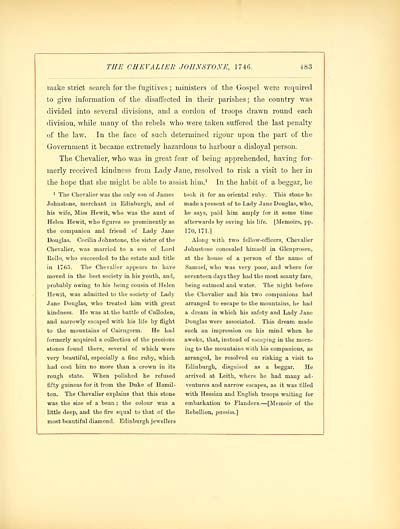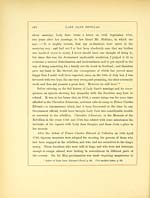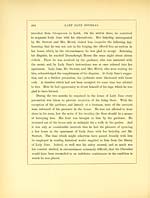Douglas book > Angus memoirs
(507) Page 483
Download files
Complete book:
Individual page:
Thumbnail gallery: Grid view | List view

THE CHEVALIER JOHNSTONE, 1746.
483
make strict search for the fugitives ; ministers of the Gospel were required
to give information of the disaffected in their parishes ; the country was
divided into several divisions, and a cordon of troops drawn round each
division, while many of the rebels who were taken suffered the last penalty
of the law. In the face of such determined rigour upon the part of the
Government it became extremely hazardous to harbour a disloyal person.
The Chevalier, who was in great fear of being apprehended, having for-
merly received kindness from Lady Jane, resolved to risk a visit to her in
In the habit of a beggar, he
the hope that she might be able to assist him. 1
1 The Chevalier was the only son of James
Johnstone, merchant in Edinburgh, and of
his wife, Miss Hewit, who was the aunt of
Helen Hewit, who figures so prominently as
the companion and friend of Lady Jane
Douglas. Cecilia Johnstone, the sister of the
Chevalier, was married to a son of Lord
Eollo, who succeeded to the estate and title
in 1765. The Chevalier appears to have
moved in the best society in his youth, and,
probably owing to his being cousin of Helen
Hewit, was admitted to the society of Lady
Jane Douglas, who treated him with great
kindness. He was at the battle of Culloden,
and narrowly escaped with his life by flight
to the mountains of Cairngorm. He had
formerly acquired a collection of the precious
stones found there, several of which were
very beautiful, especially a fine ruby, which
had cost him no more than a crown in its
rough state. Wheu polished he refused
fifty guineas for it from the Duke of Hamil-
ton. The Chevalier explains that this stone
was the size of a bean ; the colour was a
little deep, and the fire equal to that of the
most beautiful diamond. Edinburgh jewellers
took it for an oriental ruby. This stone he
made a present of to Lady Jane Douglas, who,
he says, paid him amply for it some time
afterwards by saving his life. [Memoirs, pp.
170,171.]
Along with two fellow-officers, Chevalier
Johnstone concealed himself in Glenprosen,
at the house of a person of the name of
Samuel, who was very poor, and where for
seventeen days they had the most scanty fare,
being oatmeal and water. The night before
the Chevalier and his two companions had
arranged to escape to the mountains, he had
a dream in which his safety and Lady Jane
Douglas were associated. This dream made
such an impression on his mind when he
awoke, that, instead of escaping in the morn-
ing to the mountains with his companions, as
arranged, he resolved on risking a visit to
Edinburgh, disguised as a beggar. He
arrived at Leith, where he had many ad-
ventures and narrow escapes, as it was filled
with Hessian and English troops waiting for
embarkation to Flanders. — [Memoir of the
Rebellion, passim.]
483
make strict search for the fugitives ; ministers of the Gospel were required
to give information of the disaffected in their parishes ; the country was
divided into several divisions, and a cordon of troops drawn round each
division, while many of the rebels who were taken suffered the last penalty
of the law. In the face of such determined rigour upon the part of the
Government it became extremely hazardous to harbour a disloyal person.
The Chevalier, who was in great fear of being apprehended, having for-
merly received kindness from Lady Jane, resolved to risk a visit to her in
In the habit of a beggar, he
the hope that she might be able to assist him. 1
1 The Chevalier was the only son of James
Johnstone, merchant in Edinburgh, and of
his wife, Miss Hewit, who was the aunt of
Helen Hewit, who figures so prominently as
the companion and friend of Lady Jane
Douglas. Cecilia Johnstone, the sister of the
Chevalier, was married to a son of Lord
Eollo, who succeeded to the estate and title
in 1765. The Chevalier appears to have
moved in the best society in his youth, and,
probably owing to his being cousin of Helen
Hewit, was admitted to the society of Lady
Jane Douglas, who treated him with great
kindness. He was at the battle of Culloden,
and narrowly escaped with his life by flight
to the mountains of Cairngorm. He had
formerly acquired a collection of the precious
stones found there, several of which were
very beautiful, especially a fine ruby, which
had cost him no more than a crown in its
rough state. Wheu polished he refused
fifty guineas for it from the Duke of Hamil-
ton. The Chevalier explains that this stone
was the size of a bean ; the colour was a
little deep, and the fire equal to that of the
most beautiful diamond. Edinburgh jewellers
took it for an oriental ruby. This stone he
made a present of to Lady Jane Douglas, who,
he says, paid him amply for it some time
afterwards by saving his life. [Memoirs, pp.
170,171.]
Along with two fellow-officers, Chevalier
Johnstone concealed himself in Glenprosen,
at the house of a person of the name of
Samuel, who was very poor, and where for
seventeen days they had the most scanty fare,
being oatmeal and water. The night before
the Chevalier and his two companions had
arranged to escape to the mountains, he had
a dream in which his safety and Lady Jane
Douglas were associated. This dream made
such an impression on his mind when he
awoke, that, instead of escaping in the morn-
ing to the mountains with his companions, as
arranged, he resolved on risking a visit to
Edinburgh, disguised as a beggar. He
arrived at Leith, where he had many ad-
ventures and narrow escapes, as it was filled
with Hessian and English troops waiting for
embarkation to Flanders. — [Memoir of the
Rebellion, passim.]
Set display mode to:
![]() Universal Viewer |
Universal Viewer | ![]() Mirador |
Large image | Transcription
Mirador |
Large image | Transcription
Images and transcriptions on this page, including medium image downloads, may be used under the Creative Commons Attribution 4.0 International Licence unless otherwise stated. ![]()
| Histories of Scottish families > Douglas book > Angus memoirs > (507) Page 483 |
|---|
| Permanent URL | https://digital.nls.uk/96537878 |
|---|
| Attribution and copyright: |
|
|---|---|
| Description | A selection of almost 400 printed items relating to the history of Scottish families, mostly dating from the 19th and early 20th centuries. Includes memoirs, genealogies and clan histories, with a few produced by emigrant families. The earliest family history goes back to AD 916. |
|---|

